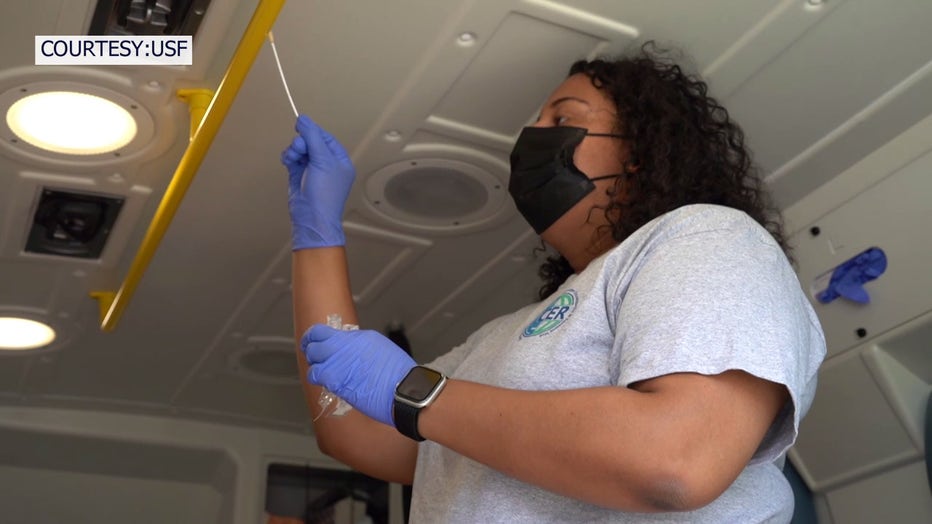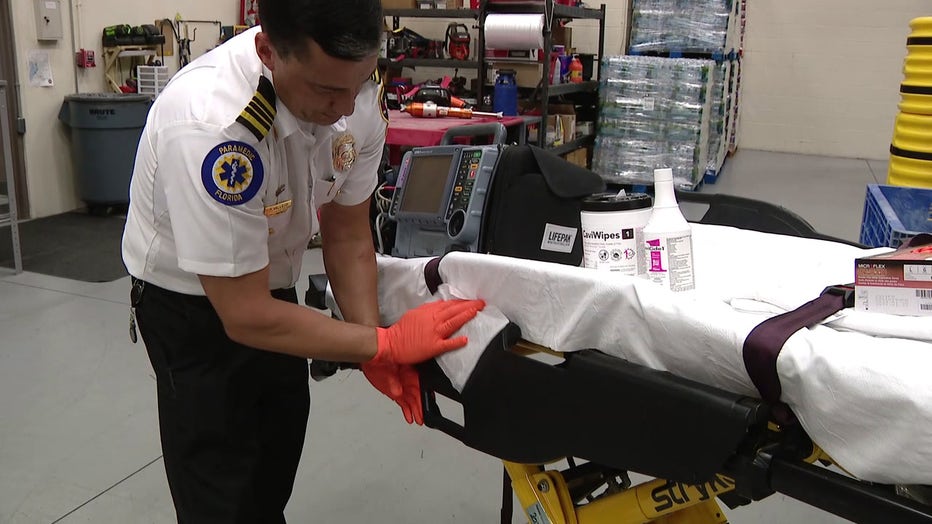USF project swabbing first responder vehicles to see what’s being missed in infection control

USF researchers working to improve infection control
A project at the University of South Florida is swabbing to test what’s being missed in infection control to improve training for first responders.
TAMPA, Fla. - Ambulances and fire trucks see a lot of action in our communities that put them in contact with various germs. A project at the University of South Florida is swabbing to test what’s being missed in infection control to improve training for first responders.
Hillsborough County Fire Rescue’s Quality Management Chief Prudencio Vallejo makes sure crews have what they need for their ambulances and fire trucks. He showed what first responders do to disinfect and decontaminate surfaces and equipment.
"We will use basic decontamination products like Lysol all the way up to a product called Cavicide," said Vallejo. "We routinely replace porous materials as well to prevent that cross contamination from happening, and we also use a number of different disinfectants depending on that need for the decontamination or the level of decontamination."
Agencies across the country train on infection prevention and control, but a project with USF is finding there are gaps. College of Public Health assistant professor and former firefighter Christine McGuire-Wolfe is leading the effort to close them.

"They don’t typically get a lot of formal training about infection prevention and control, and the materials that they do that, the guidance documents that are available, were developed for hospital settings," said McGuire-Wolfe, the director of the Infection Control for Emergency Responders (ICER) Collaborative. "What works for training nurses or respiratory therapists may not be the best way to train paramedics and firefighters."
Students at USF’s College of Public Health are working to see what can change with training needs and everyday decontamination.
"They’re going into ambulances and fire engines and the associated equipment, blood pressure cuffs, patient stretchers and swabbing for pathogens that might be present," said McGuire-Wolfe.
The students are testing for viruses, bacteria and more, noting the hot spots.

"If you have MRSA on a radio button and you think your hands are clean and you use that radio and you go and touch some other object, you have the potential to spread that contamination from spot to spot," said McGuire-Wolfe. "That will help drive some of the training efforts. You’re doing a really good job decontaminating patient stretchers and cardiac monitors, but you’ve missed all of your radio buttons and the keyboard."
Some local and national agencies are participating anonymously, and USF is working to get a mix of rural and urban agencies involved. The Centers for Disease Control and Prevention is funding the initiative until 2027 to improve what first responders are already doing.
"We’re always concerned about that cross contamination and the patient’s well-being is always the top priority for us," said Vallejo. "So, anything we can do to prevent a condition from becoming worse, that’s a high priority for us. And we also not only need to protect the patient but our employees as well."
McGuire-Wolfe said they are also involving law enforcement in the initiative to swab patrol vehicles. The project has lasted two years so far, which included a needs assessment, and they are finding what type and length of training works best for the first responders.
"Part of this effort is to find ways that we can engage the professional community into training their personnel ahead of time but also in ways that are effective for them," she said.
WATCH FOX 13 NEWS:
SIGN UP: Click here to sign up for the FOX 13 daily newsletter

